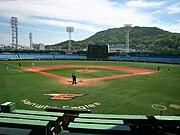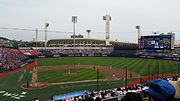KBO League

|
|
| Current season | KBO Season 2017 |
| sport | baseball |
| abbreviation | KBO League |
| Association | Korea Baseball Organization |
| League foundation | 1982 |
| Teams | 10 |
| Country countries |
|
| Title holder | Doosan Bears (2019) |
| Record champions | Kia Tigers (11) |
| Korean spelling | |
|---|---|
| Korean alphabet : | 한국 야구 위원회 |
| Hanja : | 韓國 野球 委員會 |
| Revised Romanization : | Hanguk Yagu Wiwonhoe |
| McCune-Reischauer : | Han'guk Yagu Wiwŏnhoe |
The KBO League is the highest league in professional baseball in South Korea . It is organized by the Korea Baseball Organization ( KBO ). The league was founded in 1982 with six teams; today it consists of ten teams. In 2017, the KBO League was the most-visited South Korean sports league with a total of over 8.4 million viewers.
The season starts at the end of March and ends in October with the playoffs and the Korean Series . Most of the teams are owned and named by Jaebeol , the big industrial conglomerates.
Current composition
| team | Owner / main sponsor | Home stadium | Places | city |
|---|---|---|---|---|
| Doosan Bears | Doosan | Jamsil ballpark | 30,265 | Seoul |
| Hanwha Eagles | Hanwha | Daejeon Ballpark | 12,768 | Daejeon |
| Kia Tigers | Kia Motors | Gwangju Mudeung Ballpark | 15,200 | Gwangju |
| Lotte Giants | Lotte | Sajik ballpark | 30,543 | Busan |
| LG Twins | LG Group | Jamsil ballpark | 30,265 | Seoul |
| Samsung Lions | Samsung Group | Daegu Samsung Lions Park | 24,000 | Daegu |
| SK Wyverns | SK Group | Munhak Ballpark | 30,480 | Incheon |
| Kiwoom Heroes | Centennial Investment / Kiwoom Securities | Gocheok Sky Dome | 16,813 | Seoul |
| NC dinosaurs | NCsoft | Changwon NC Park | 22,011 | Changwon |
| KT Wiz Suwon | Korea Telecom | Suwon Ballpark | 22,067 | Suwon |
Game mode
In the regular season, each of the 10 teams played 144 games (16 against each competitor) for a total of 720 games.
This is followed by the playoffs in October , which begin with a best-of-five series between the third and fourth. The winner then plays a best-of-seven duel against the runner-up in the regular season. The winner qualifies for the Korean Series ( Hanguk Series ) against the league first, in which the championship will be decided in a maximum of seven games - plus possible draws - at the end of October.
The winner took part in the Asia Series against the champions of China, Japan and Taiwan between 2005 and 2008 in November . In 2009 there will only be one game against the Japanese champions.
All-Star Game
In the middle of July every year, the KBO's All-Star Game takes place, in which the best players in the league face each other as “East” and “West”. The "East" team consists of players from the SK, Samsung, Doosan and Lotte teams, the "West" team consists of the cadres from Kia, Hanhwa, LG and Woori. The cardinal points do not correspond to a geographical division: The four teams from the northwestern population centers Seoul and Incheon are divided equally between East (SK, Doosan) and West (LG, Woori).
regulate
Rules of the game
In the KBO League - in contrast to Major League Baseball - the game result 'draw' is possible: In the event of a tie, a game is counted as a draw in the regular season after 12 innings and in the postseason after 15 innings.
Limitation of foreign players
Teams may have a maximum of two foreign players in their squad. Foreign players come mainly from the United States, the Dominican Republic and Cuba. Successful players in the KBO often switch to the Japanese NPB , with Lee Seung-Yeop and Tyrone Woods among the best-known .
history

The opening game took place on March 27, 1982 between the Samsung Lions and the MBC Blue Dragons at Dongdaemun Stadium in Seoul . President Chun threw the first pitch.
The founding teams were:
- the Samsung Lions from Daegu ,
- the Haitai Tigers from Gwangju ,
- the Lotte Giants from Busan ,
- the MBC Blue Dragons ( MBC Cheongryong ) from Seoul ,
- the OB Bears from Daejeon and
- the Sammi superstars from Incheon .
In 1985 the Sammi Superstars became the Cheongbo Pintos . A year later, in 1986, the OB Bears moved from Daejeon to Seoul and from then on shared the Jamsil baseball stadium with MBC Cheongryong. Instead of the Bears, the Binggrae Eagles were settled in Daejeon, the league grew to seven teams. In 1988 the Pintos changed hands again and were now called Taepyeongyang Dolphins. In 1990 the MBC Cheongryong became the LG Twins and with the Ssangbangul Raiders from Jeonju in Jeollabuk-do Province , the league was expanded by an eighth team.
In the 1990s there were only minor changes to the league structure when some teams changed hands: In 1993 the Binggrae Eagles became the Hanhwa Eagles , in 1995 the Taepyeongyang Dolphins became the Hyundai Unicorns and the OB Bears in 1999 became the Doosan Bears . In 2000 there were again major changes when the Raiders stopped playing. The SK Wyverns from Incheon were added, and the Hyundai Unicorns moved to Suwon . In 2001, Kia took over the Haitai Tigers. Another change came in 2008 when the Hyundai Unicorns moved to Seoul as Woori Heroes . In 2013, NC Dinos from Changwon joined the team as the ninth team . Most recently, the KZ Wiz team from Suwon completed the league that currently consists of ten teams. In 2018, the Nexen Heroes changed their main sponsor and have since played under the name Kiwoom Heroes in South Korea's first indoor ballpark, the Gocheok Sky Dome, which opened in 2016.
Stages
| Doosan Bears / LG Twins | Hanwha Eagles | Kia Tigers | KT Wiz | Lotte Giants |
|---|---|---|---|---|
| Jamsil Baseball Stadium | Hanwha Life Eagles Park | Gwangju-Kia Champions Field | Suwon kt wiz park | Busan Sajik Baseball Stadium |
| Capacity: 25,553 | Capacity: 13,000 | Capacity: 22,244 | Capacity: 22,067 | Capacity: 26,800 |

|

|

|

|

|
| NC dinosaurs | Kiwoom Heroes | Samsung Lions | SK Wyverns | |
| Changwon NC Park | Gocheok Sky Dome | Daegu Samsung Lions Park | Munhak Baseball Stadium | |
| Capacity: 22,011 | Capacity: 16,813 | Capacity: 24,000 | Capacity: 26,000 | |

|

|

|
master
The record champions are the Kia Tigers with eleven titles. From 1982 to 2001 they played under the name Haitai Tigers .
- 1982: OB Bears
- 1983: Haitai Tigers
- 1984: Lotte Giants
- 1985: Samsung Lions
- 1986: Haitai Tigers
- 1987: Haitai Tigers
- 1988: Haitai Tigers
- 1989: Haitai Tigers
- 1990: LG Twins
- 1991: Haitai Tigers
- 1992: Lotte Giants
- 1993: Haitai Tigers
- 1994: LG Twins
- 1995: OB Bears
- 1996: Haitai Tigers
- 1997: Haitai Tigers
- 1998: Hyundai Unicorns
- 1999: Hanwha Eagles
- 2000: Hyundai Unicorns
- 2001: Doosan Bears
- 2002: Samsung Lions
- 2003: Hyundai Unicorns
- 2004: Hyundai Unicorns
- 2005: Samsung Lions
- 2006: Samsung Lions
- 2007: SK Wyverns
- 2008: SK Wyverns
- 2009: Kia Tigers
- 2010: SK Wyverns
- 2011: Samsung Lions
- 2012: Samsung Lions
- 2013: Samsung Lions
- 2014: Samsung Lions
- 2015: Doosan Bears
- 2016: Doosan Bears
- 2017: Kia Tigers
- 2018: SK Wyverns
- 2019: Doosan Bears
Audience numbers
The following shows the total attendance figures for the KBO League over the past few years.
| year | spectator |
|---|---|
| 2010 | 5,928,626 |
| 2011 | 6,810,028 |
| 2012 | 7.156.157 |
| 2013 | 6,441,945 |
| 2014 | 6,509,915 |
| 2015 | 7,360,530 |
| 2016 | 8,339,577 |
| 2017 | 8,400,688 |
| 2018 | 8,073,742 |
Web links
- Official Website (Korean)
- BaseballGuru.com: Korean Baseball Primer (English)
Individual evidence
- ↑ a b KBO postseason opens in Korea, following 8.4 million regular-season attendance. WBSC, July 10, 2017, accessed August 31, 2018 .
- ↑ Pro Baseball Leagues open 2016 seasons worldwide - approx. 150 million fans expected. WBSC, April 17, 2016, accessed August 31, 2018 .
- ↑ Korea pro baseball league KBO breaks nation's attendance record, surpasses 8 million. WBSC, September 30, 2016, accessed August 31, 2018 .

